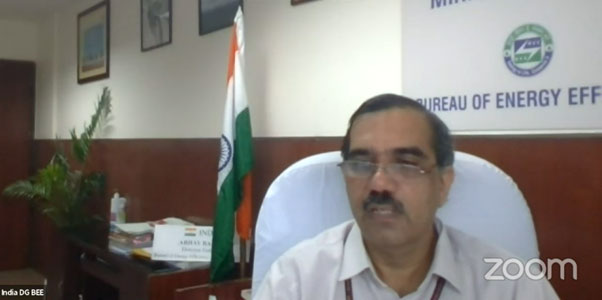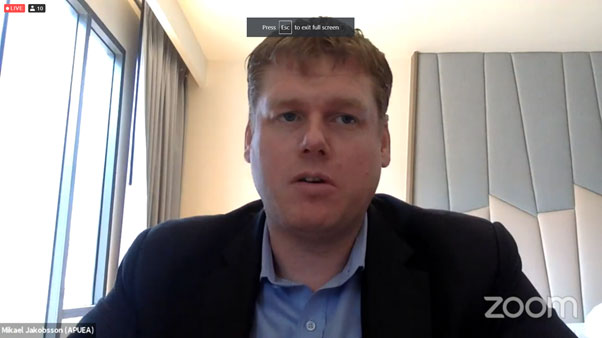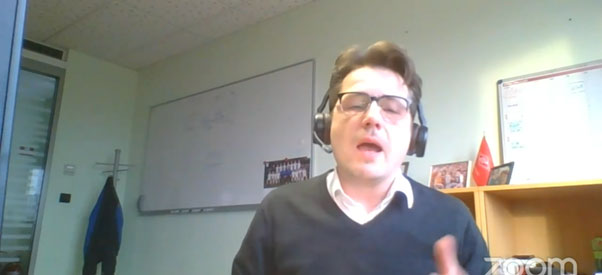On the third day of ISUW 2021, the India Smart Grid Forum (ISGF) hosted a workshop on the critical issue of district cooling systems (DCS). The speakers in this session included Abhay Bakre, director general, Bureau of Energy Efficiency (BEE); Martin Schefler, co-founder, Auroville Consulting; Arijit Sengupta, director, BEE; S.P. Garnaik, executive director, Energy Efficiency Services Limited (EESL); Laxmi Rao, senior director, International District Energy Association (IDEA); Dimitry Bochkalov, senior director, global business development, Danfoss; Sudheer Perla, country head, Tabreed; Mikael Jakobsson, executive director, APUEA; Rahul Agnihotri, coordinator, district energy initiatives South Asia, UNEP; Rajeev Sharma, vice-president, Gujarat International Finance Tec-City (GIFT City); Peter Lundberg, head of operations, APUEA; Teruhisa Oi, principal energy specialist, Asian Development Bank (ADB); Ganesh Das, head iInnovation and R&D, Tata Power-DDL; Dhiraj Wadhwa, director, Carrier India; Prameet Gupta, Tabreed; and Shubhasish Dey, director, climate policy, Shakti Foundation.
The workshop evaluated the key activities that need to be undertaken in terms policy and regulations, commercially viable business models, innovative financing options and new technologies to implement DCS in developing countries. It also shared the key learnings from international experiences.
Abhay Bakre delivered a special address at the workshop. “DCS has numerous operational and technical benefits and is one of the best options available to save energy and ensure reliable power supply. BEE is very keen to promote such initiatives through initial pilots and guidelines,” he noted. Identifying some of the challenges for DCS in India, he noted that the huge capex requirement was a key concern. Also, while new consumers would definitely benefit from DCS, it is a challenge to get consumers, who are habituated to existing local systems, to opt for DCS. Retrofitting of existing townships would also be a challenge.
 Abhay Bakre, Director General, Bureau of Energy Efficiency
Abhay Bakre, Director General, Bureau of Energy Efficiency
Some of the other key points discussed at the session were:
- In India, the majority of cooling is done from coal-based energy, which contributes to local pollution and climate change.
- The space cooling requirement for buildings is expected to grow by eleven times. By 2050, India is expected to be the largest consumer of space cooling, which will account for 28 per cent of electricity demand and 44 per cent of peak load.
- Cooling as a service model can be used for rolling out DCS, which can play a vital role in meeting Nationally Determined Contribution commitments and Sustainable Development Goals.
- There is a lot to learn from international experience in markets such as Singapore, which is a highly mature market; China, which is the largest DCS market globally; early adopters such as the US; and the Middle East, which has the largest capacity plants.
- DCS has been implemented in India for the first time at GIFT City.
- Developing urban municipal plans on cooling would also be key to the promotion of DCS.
- Airports are an area that can be considered for DCS. Commercial clusters too could benefit from DCS; or even just a few buildings, as long as scale advantages are delivered.

Arijit Sengupta, Director, Bureau of Energy Efficiency

Martin Schefler, Co-Founder, Auroville Consulting

Rajeev Sharma, Vice-President, GIFT City

Sudheer Perla, Country Head, Tabreed

Laxmi Rao, Senior Director, International District Energy Association

Mikael Jakobsson, Executive Director, APUEA

Dimitry Bochkalov, Senior Director, Global Business Development, Danfoss
Supporting Ministries 2021

KEY PARTNERS 2021
Powered by: 
Host Utilities: 
Co-Host Utilities: 
Partner Utilities: 
Platinum Partner: ![]()
ISGF Innovation Awards Partner: 
Gold Partner: 
Session Partner: 
Technology Partner: 
Silver Partners: 
Country Partners: 
Bronze Partners: 
ISUW 2021 EXHIBITORS

